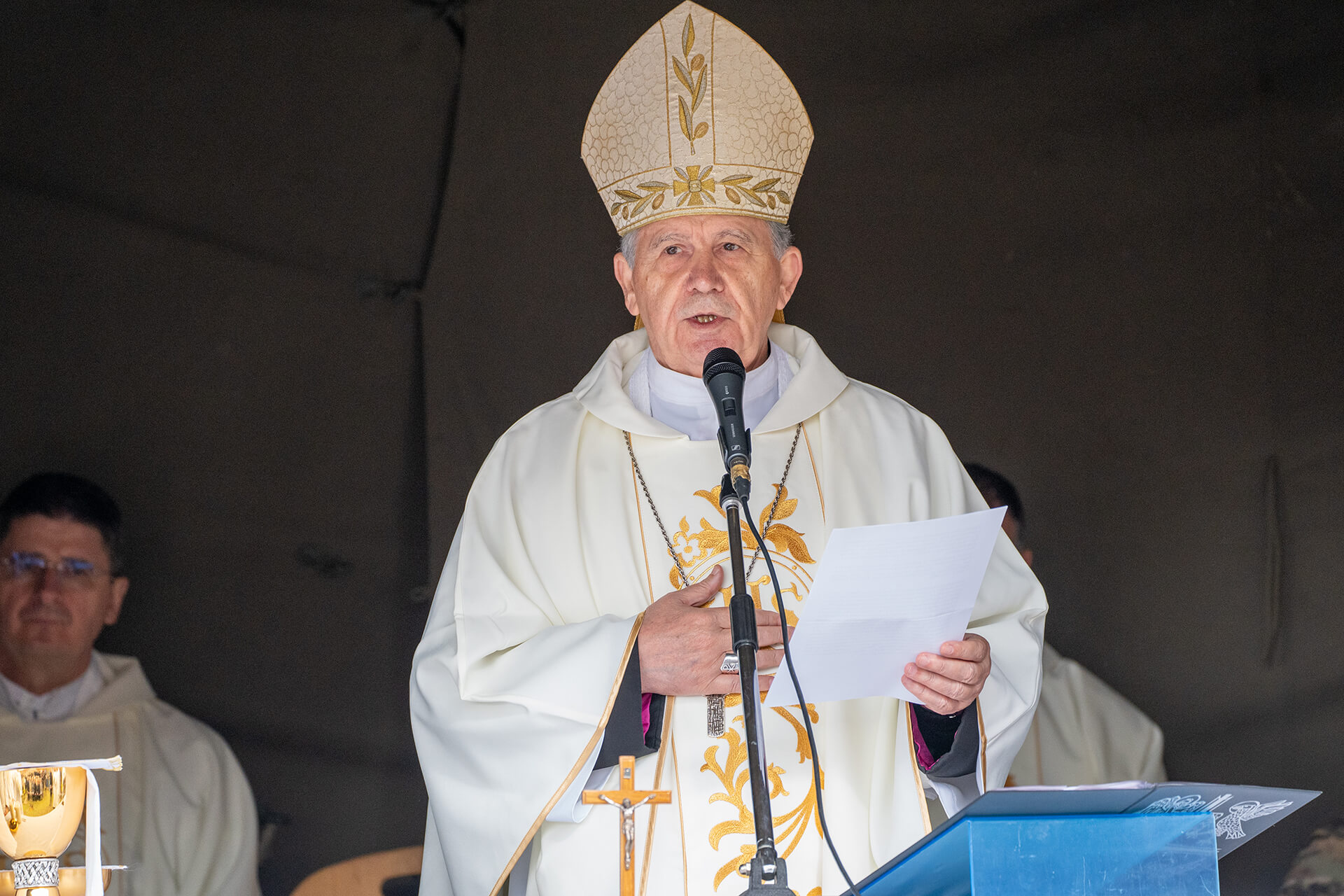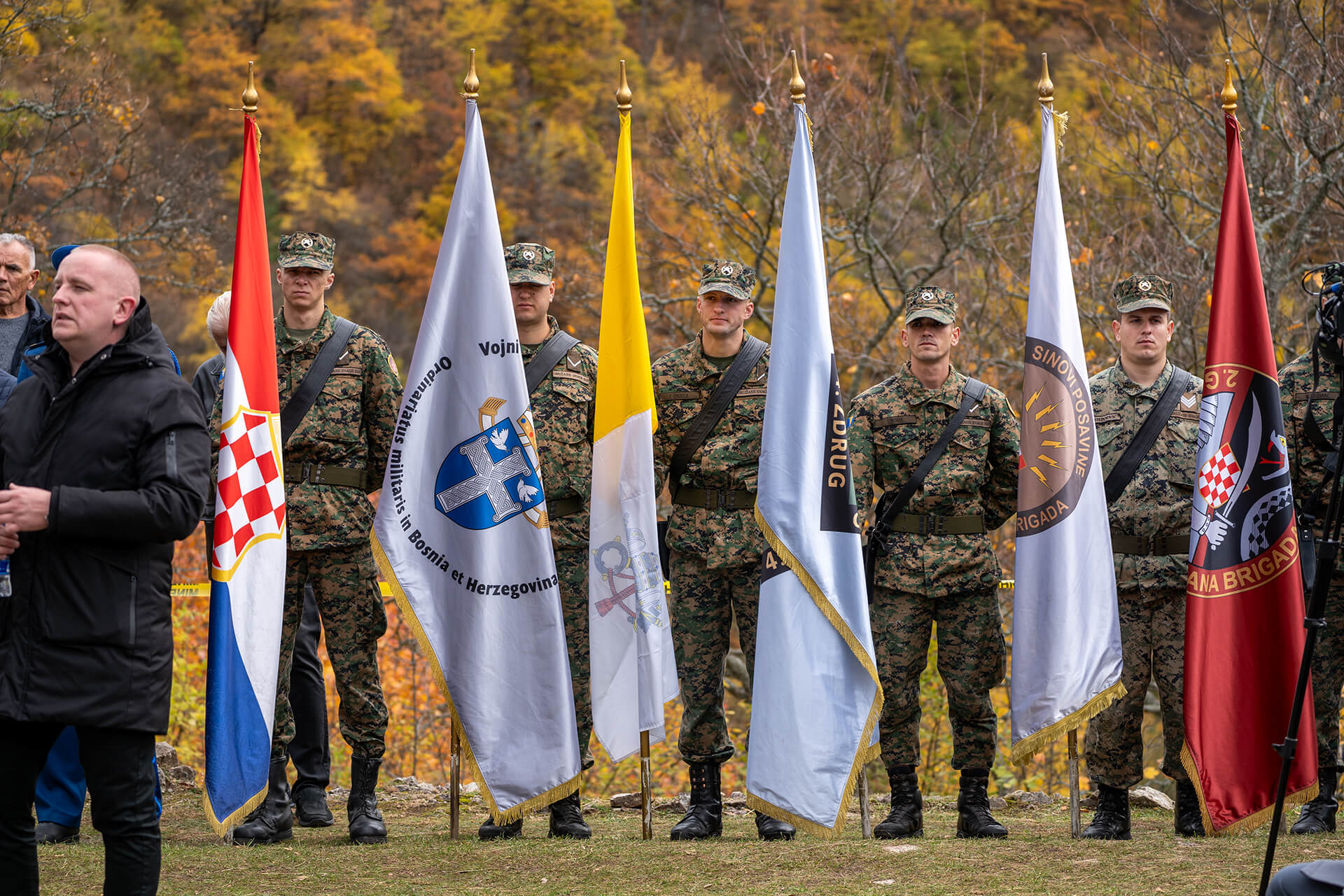As believers, we strive for a better homeland - a heavenly one
sub, 25. listopada 2025. 18:01
The twenty-fourth Day of Prayer for the Homeland of the Archdiocese of Vrhbosna and the twenty-second pilgrimage to Bobovac of Catholics from the Ministry of Defence, Armed Forces and Police of BiH were held on Saturday, October 25th.
The Holy Mass celebration in Bobovac, which is located in the parish of Kraljeva Sutjeska, was led by the Archbishop of Vrhbosna, Metropolitan and Apostolic Administrator of the Military Ordinariate in BiH, Msgr. Tomo Vukšić. About 20 priests concelebrated, including the vicars general of the Archdiocese of Vrhbosna, Msgr. Slađan Ćosić, the Military Ordinariate in BiH, Msgr. Željko Čuturić, and the Military Ordinariate of the Republic of Croatia, Msgr. Ilija Jakovljević.
A large number of believers participated, much more than in last year's pilgrimage, who completely filled the Bobovac plateau, reaching it in a procession, praying the entire way. Among those present were representatives of the political life of Croats in BiH: the president of the HDZ BiH and the Croatian National Assembly, Dragan Čović, and the president of the Federation of BiH, Lidija Bradara, as well as the Deputy Minister of Defence of BiH, Slaven Galić, and the Deputy Chief of the Joint Staff of the Armed Forces of BiH, Major General Tomo Kolenda.
Pilgrimage
At the beginning of the homily, which he entitled All Paths to the Heavenly Homeland Lead Exclusively Through Responsibility for the Earthly One, the Archbishop, greeting the pilgrims, explained that the heavenly Homeland is acquired by building the earthly one, because the door to the heavenly Homeland is opened to a person only by his responsible action for the earthly one and care for all of God's creatures in it, especially for other people.

"We are fully aware that human life on earth is a period of pilgrimage through an earthly homeland and that it ends with an exodus. It is clear to us that 'we do not have here a lasting city, but we seek one to come' (Heb 13:14). Together with all other people, we are thus strangers and newcomers on earth (cf. Heb 11:13). Therefore, as believers, we long for a better homeland, that is, a heavenly one (cf. Heb 11:16). At the same time, the earthly homeland, its people and other creatures of God are places of testing and proof of how sincerely and devotedly we long for the heavenly homeland because, in addition to confessing faith in Christ the Saviour, we also believe that another person is the way of the Church and that the same person is the place and way of our salvation. Therefore, this time is the time of our salvation. Our cities and villages are the only places where we can achieve this. And the people we meet are the only opportunity given to us. When it passes, we simply cannot get another chance", said the preacher, emphasizing that the Construction of the Earthly City is a moral obligation of all its inhabitants.
A Three-fold Level
The Archbishop further recalled that Christian teaching interprets that loving another means desiring his good and truly working for it, as well as for the community to which one belongs. "Thus, the commitment of a Christian believer to good, joy, harmony and progress occurs on a three-fold level, which could be called I-some-all, and none of these levels should be forgotten or excluded. Namely, the entire life of a person takes place on the individual level of a single person, on the level of a part such as the family or some other group, for example ethnic, and on the level of the entire social community. Therefore, desiring the common good and working towards it is an obligation. And to strive for the common good means contributing to others and at the same time using these contributions for one's own individual good. It is true that a person loves another the more he works for the common good. Therefore, a Christian has a moral obligation to act in this sense and can in no way be exempted from this obligation", he encouraged.

Furthermore, Msgr. Vukšić explained that the common good encompasses a set of conditions of social life that enable groups and individuals to more fully and more easily reach their own perfection, and he said that in order to achieve this good, three things are necessary: respect for and promotion of the fundamental rights of every human person; well-being or development of spiritual and temporal social goods that are accessible to all; and peace and security of the entire community and its members.
Responsibility of those in authority
In addition, the preacher explained that Catholic teaching also teaches that respect for every human person leads us to see our other self in others, which includes respecting fundamental rights that stem from the intrinsic dignity of the person. In this, he added, the greatest responsibility lies with those who exercise public authority.
"In addition to acting on a personal level and actively contributing to the community and society, the prayer of Christians is a special form of their responsibility and an ex
"Lord, grant (those who hold power) health, peace, harmony, perseverance, that they may exercise the power entrusted to them without hindrance. You, Lord, heavenly King of the ages, give glory, honour and power on earth to the children of men. Therefore, Lord, guide their decisions, that they may do what is good and pleasing to you, and so enable them to devoutly, peacefully and gently exercise the authority that you have entrusted to them, so that they may be worthy of your mercy.”
The Holy Eucharist was animated by the church choir of the parish of Vareš.
Occasional gift-giving
At the end of the Eucharistic celebration, Msgr. Čuturić thanked those present, and especially the members of the Armed Forces of Bosnia and Herzegovina from the Second Infantry Battalion of the Fifth Infantry Brigade Kiseljak, who have been participating for many years in the organization and logistical support so that the Holy Mass could be celebrated with dignity and at the end they traditionally prepared a meal, military beans, for all participants.
After that, the employees of the Border Police of Bosnia and Herzegovina presented an appropriate gift to Archbishop Vukšić. Also, and as is the tradition of the Day of Prayer in the royal city of Bobovac, the deputy director of the Zenica Penitentiary Ivica Dujmović presented a painting to Msgr. Jakovljević, and the commander of the guard of the Zenica Penitentiary presented a gift to the church choir of the parish of Vareš. Since Mr. Dujmović is retiring, his employees presented him with gifts for everything he has done.
And, at the end, the faithful, led by Archbishop Tomo, traditionally prayed the Prayer for the Homeland.
Cardinal Puljić's Initiative
Let us also mention that the Day of Prayer for the Homeland of the Archdiocese of Vrhbosna and the pilgrimage to Bobovac of Catholics from the Ministry of Defence, Armed Forces and Police of BiH are traditionally held on the Saturday closest to the date of the death of the next to last Bosnian queen Katarina Kosača-Kotromanić, who died in 1478 in Rome.
The initiative for the Day of Prayer in Bobovac was launched in 2002 by the then Archbishop Metropolitan of Vrhbosna, Cardinal Vinko Puljić in memory of the death of the Bosnian Queen Katarina Kosača with the aim of uniting in prayer for personal needs, one's own people and homeland Bosnia and Herzegovina, but also for all people and nations living in it. Thus, since 2002, the faithful of the Archdiocese of Vrhbosna have been making a pilgrimage to Bobovac, and two years later they were joined by members of the Armed and Police Forces of Bosnia and Herzegovina.
Historical data show that Bobovac was the most important and best fortified city in medieval Bosnia, built on the rock of the southern slopes of the Dragovska and Mijakovska poljica mountain massif southwest of Vareš. It was located not far from the villages of Mijakovići and Dragovići, in the municipality of Vareš. The city was conquered by the Ottomans on May 21st, 1463, and had garrisons in it until 1626, when it was abandoned because it no longer had strategic importance.








































































.jpg&w=420&h=235&zc=1&hash=26473c206c3c92bbd0605a60fac12ccf)
.JPG&w=420&h=235&zc=1&hash=d9cd2b373ec1993a080f421953da5f5a)

